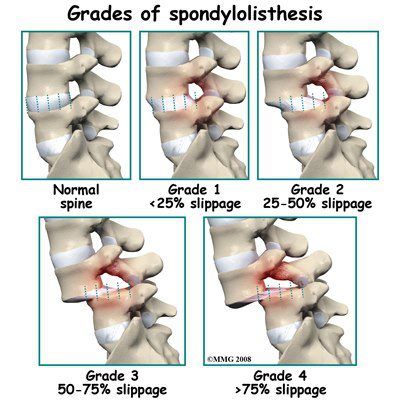What is Spondylolisthesis?
It is a name derived from the Greek language: spondylos is a vertebra, and listhesis means slipping.
We call this phenomenon spondylolisthesis when a vertebra slips forward over another vertebra. The lumbar spine is the most common area of location. The complaint is usually pain or ache in the low back, buttocks and sometimes thighs. It may be accompanied by muscular tightness and/or weakness in the glutes and hamstrings. However, young individuals do not report any symptoms in general, or rather some discomfort. X-Rays are the predominant investigation to diagnose its presence. The scale grades it in a range of 1 to 4, according to the slippage measure.
Stress Fracture
Most of the time, it is developed during childhood. However, it can be present at birth (it is said then congenital) or in adulthood after an accident or repetition of movements. The widespread cause of spondylolisthesis is a stress fracture during growth. The recurrence of backward movements like bridges puts a severe load on the parts of the vertebra not strong enough to cope with this charge, and they "crack". The sports often implied are gymnastics, dance, judo and martial arts, rugby, and weightlifting. The stability of the spine is then modified and creates severe tensions around.
Degenerative Spondylolisthesis
The degenerative process is another cause of spondylolisthesis. The slippage can be forward, anterolisthesis, or backwards, retrolisthesis. This happens after 40 or 50, primarily due to a genetic history of heavy lifting during working time. The nerves which go through between the vertebrae may be impinged by the narrowing of the canals (holes), and then pain, numbness, weakness are resent in the lower limbs. The walking perimeter is reduced, and to open the canals, the individual feels the need to sit to "open" the canals and relieve the nerves from the pressure.
Treatment of Spondylolisthesis
Spondylolisthesis can be "silent", which means that the person does even not know about their condition and does suffer from it. On the opposite, the symptoms can be severe and may demand a surgical operation before significant compression of the nerves. Regarding ache, stiffness and tensions, chiropractic adjustments are recommended but not regarding the slipping vertebra. At Orewa Chiropractic, we have long experience with sports injuries and degenerative spinal conditions and assist the patient in reducing the level of ache/pain and increasing the flexibility of the spine. Visit us.
.